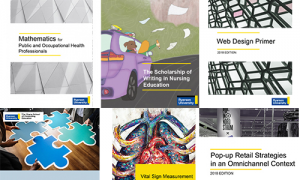
For nearly a decade, the Ryerson Library has worked with external and internal partners (Centre for Excellence in Learning and Teaching, and Digital Educational Strategies at the Chang School) to provide leadership in, and support for, Open Education Resources (OER) in higher education. OERs are openly licensed and freely available learning materials for students that can be used, adapted, reproduced, copied, and shared. These include: courses, modules, textbooks, multimedia, assessments, and supplementary materials.
At Ryerson, the Library’s role in building a positive university-wide OER environment has focused on supporting the adoption, adaptation, and creation of OER. Most recently, the Library introduced OER grants to help fund the development of open education resources that support specific course needs. From the outset, grant objectives have been “to provide support for the review, revision and adoption of open textbooks and other OER materials,” and to, “increase the use of OER at Toronto Metropolitan University resulting in pedagogical innovation, enhanced access for students, and reduced textbook and class material costs.”
Simply put, the grants allow Ryerson faculty to adapt current OER, or create new OER content in support of student learning at the university—positively impacting equity and ensuring all students have access to required course materials.
An added benefit of the grants has been the Library’s ability to employ students to work on OER projects with faculty and librarians. Students learn about open publishing, expand their digital skill sets and subject matter knowledge, all while making a positive impact on student success.
“Open Education Resources can be transformative for student learning and teaching innovation,” say Ryerson Chief Librarian, Carol Shepstone. “The Library is thrilled to provide these experiential opportunities for students, while also providing leadership in advancing OER at the university, as well as nationally and provincially.”
In addition to granting opportunities, Ryerson librarians and OER experts Sally Wilson, Ann Ludbrook and Kelly Dermody work to build partnerships with Ryerson faculty who are also committed to creating OER materials. Increasingly, the Library, faculties and departments, have witnessed greater interest from faculty members in developing and employing open resources in courses. And, for the past several years, the Library has provided publishing support through Ryerson Pressbooks, which now hosts fourteen open course resources, not including the 2018/2019 and 2019/2020 OER grant recipient projects.
This past summer, working with the Library, Faculty of Community Services Professor Ian Young, created and published Mathematics for Public and Occupational Health Professionals for his fall course that had an enrollment of 150 students. The response from the students, and Library, was overwhelmingly positive. “Working with Dr. Young and a Library Career Boost student to create a customized textbook was very rewarding,” says Web Services Librarian, Sally Wilson. “The result was a text tailored to a particular course, freely available to all students.”
Once open resource material is published on the Pressbook platform, the Library is then able to provide additional support by gathering metrics, usage statistics for authors, and information about the community impact beyond Ryerson. Along with important copyright advice and education, the Library also helps to ensure discoverability by applying enhanced metadata and ISBNs.
Creating freely available, pedagogically innovative, and current learning resources are certainly primary motivations for supporting the development of OER, but equity is also about accessibility and adhering to the principles of Universal Design for Learning. Accessibility Services Librarian, Kelly Dermody notes that, “OER’s are a more ideal solution for ensuring accessibility since they are already online and have no digital locks—meaning they can be quickly converted to multiple accessible formats.”
Supporting and strengthening OER resources at Ryerson, as well as provincially and nationally, is about student success and relieving some of the barriers to higher education. In addition to campus initiatives, the Ryerson Library works in collaboration with academic libraries across Ontario and Canada through the Ontario Council of University Libraries (OCUL), eCampusOntario (2018 to 2019), the Canadian Association of Research Libraries (CARL), and internationally with the Scholarly Publishing and Academic Resources Coalition (SPARC), to advance OER. “Students’ needs are foremost when it comes to supporting OER,” says Copyright and Scholarly Engagement Librarian, Ann Ludbrook. “It is one more way the Library can help make attending university more affordable, equitable and accessible for all students.”